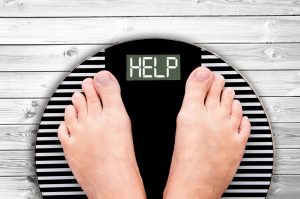by Sher Delva | Jun 5, 2017 | Addiction, Addiction Stigma, Detox, Drug Abuse, Mental Health, Stigma, Therapy, Withdrawal

If you have gained a significant amount of weight after rehab, rest assured you are not alone. Like the freshman 15, gaining weight is practically expected. In fact, 65 percent of people gain weight after leaving rehab. Even more struggle with eating disorders, compulsive overeating, or what is now known as “food addictions.” What is the correlation and how can we get to the bottom of this?
First, we must look at the brain. Drug addiction and overeating have similar effects in the brain. When you were using drugs, it released happy chemicals like dopamine and serotonin which made you feel good. After becoming sober, you may find that you use food to acquire those same happy chemicals.
You might try to “replace” the high you felt from drugs with unhealthy foods. Foods high in fat, sugar, and calories tend to initiate a quick dopamine response in the brain. Unfortunately, like drugs, this happy feeling does not last long. Eventually, you crash and then try to eat again to achieve that same feeling. Substituting food for drugs or alcohol may lead to compulsive overeating and yes, weight gain.
Weight gain can be a source of personal suffering for some, and may even lead to a relapse. It can also contribute to health consequences like heart disease, high blood pressure, and diabetes. It is important to address the reasons why you have gained weight in recovery. Nutrition is crucial in the early stages of recovery, so it is important to recognize when you are not taking care of yourself properly.
Five common reasons people struggle with weight gain during recovery:
-
Stress
Stress is a risk factor for overeating. In the early stages of recovery, you may find yourself under a lot of stress, and now you do not have your drug of choice to mask those feelings. Research has shown time after time how stress can lead to overeating. For many, stress can lead to compulsive overeating and obesity.
-
Lack of Dopamine
One major reason for overeating is a lack of dopamine receptor in the brain. When the brain is low in dopamine, it affects impulse control and emotional regulation. Most people with any addiction have a lack of dopamine in the brain. The brain does not instantly recover once you stop using. In the absence of drugs for this reward mechanism, food becomes the next best thing. Weight gain inevitably follows.
-
History of Eating Disorders
Another reason for weight gain is a history of eating disorders before entering rehab. Dual diagnosis in rehab is extremely common. Many enter rehab with other psychological conditions including eating disorders. Almost 40 percent of women in recovery meet the criteria for an eating diagnosis. Men in treatment also experience binge eating and weight gain, especially in the beginning as they seek to satisfy cravings for drugs and alcohol. Few treatment centers screen their clients for eating disorders, so this is often not addressed once the recovering addict exits treatment.
-
Untreated Depression or Anxiety
As stated above, dual diagnosis is very common in treatment. Many addicts enter treatment with a history of anxiety and depression. Treatment for mood disorders can help reduce the risk of overeating related to these co-occurring disorders. Often, anxiety and depression can lead a person to overeat in an attempt to relieve themselves of these emotional hardships. Overtime, overeating occurs which leads to weight gain.
-
Nutritional Deficiencies
In some ways, weight gain after recovery is not a bad thing. Many recovering addicts are nutritionally deficient after detoxing from drugs. Chances are, there eating behaviors and lifestyle choices were not healthy while using. Eating can be a way of restoring your mind and body back to health. It is important to eat the right foods, however overstressing about weight gain should not be your main concern after leaving treatment. Your body may just be in a healing process. Your priority should be staying sober.
Despite the importance of nutrition in recovery, it is uncommon for treatment facilities to address it. It is important to go to a facility that incorporates wellness into the recovery process. While in treatment, take steps to eating healthy and exercising so that it becomes a lifestyle change upon leaving treatment.
There are steps that you can take to improve your overall health and well-being. Talk to your doctor about supplements you can take to help make the process easier. We encourage you to develop a healthy eating and exercise plan while you are in treatment. The staff at your facility may be able to help you along this process.
Overall, being mindful of your health while in treatment and after treatment is important. If you have gained weight after rehab, do not fret. Simple changes can turn it all around.
CALL NOW 1-888-922-5398
by staff | Jun 2, 2017 | Addiction, Detox, Drug Abuse, Prescription Drugs, Withdrawal

Here we are going to take a look at withdrawal symptoms. We will look at what they are, what determines how you will experience them and talk about how long they last. Then, what is the best way to overcome withdrawals.
How Long Do Withdrawals Last: What is Drug Withdrawal?
Drug withdrawal refers to the group of symptoms that occur upon the sudden discontinuation or even the decrease in consumption of prescription medications, illegal recreational drugs or even some other everyday substances like caffeine.
In order to experience withdrawal an individual must have first developed a dependence on the substance. This dependence can be physical, psychological, or both. Using a substance for an extended period of time will cause the body to gradually adapt in one way or another until it has become used to having it. Once the substance is removed or decreased, there becomes an imbalance in the body or mind as the individual is used to functioning with the substance.
There are many elements that symptoms of drug withdrawal, and the length of that withdrawal, vary depending on the drug of abuse and the length of the addiction.
How Long Do Withdrawals Last: Period of Use
The period of time one uses a drug can contribute to the length and intensity of the withdrawals. For someone who has been using drugs for a few months, the residual impact of those drugs may not be as strong or last as long as someone who has been using drugs for several years.
Because the body takes time to become dependent, the longer you are using a drug the more tolerance you build to it. Also, the functions of the body and mind can be altered by prolonged drug use to the point where they may take a long time to full heal. In some instances research has suggest there is damage that cannot be undone.
How Long Do Withdrawals Last: Different Substances
Of course one of the primary factors to answering this question is to identify the specific substance. Different substances will create different withdrawals, which will last different lengths of time and impact an individual in different ways. Some examples of specific withdrawals and how long they last include:
- Heroin and prescription painkillers: Many people experience flu-like symptoms that last for at least 24-48 hours
- Benzodiazepines (Benzos): People using benzos often experience withdrawals like anxiety and/or seizures, which can last weeks or even months
- Cocaine: For someone withdrawal from cocaine addiction, depression and restlessness lasting at least 7-10 days can occur
- Alcohol: Withdrawals from alcohol abuse can cause tremors and/or seizures, which can last from three days up to several weeks
So prolonged use of anti-depressants like the benzo drug Xanax will cause a much different reaction that withdrawals from an opioid like heroin. Some may be the same.
Don’t forget, these symptoms can be made even worse depending on other factors, such as length of time the substance has been used, at what dosage and how the drug was consumed.
How Long Do Withdrawals Last: General Withdrawal Timeline
Many sources have gathered data that could be used to make a rough estimate of how long withdrawals may last for certain substances. However, this general timeline cannot be guaranteed to be accurate considering each individual’s own health and habits can make these timelines vary.
Prescription Opioids
- 8-12 hours after last dose, for drugs like OxyContin and morphine, the withdrawals can start around this point
- 12-48 hours after the last dose the intensity of withdrawals can peak
- 5-10 days even up to a month or more after last dose opioid withdrawals can persist
Methadone
- 24-48 hours after last dose the withdrawals can begin
- Methadone withdrawals will peak in first few days
- Withdrawals will typically last 2 weeks or more
Benzos
- 1-4 days the withdrawals from drugs like Xanax, Valium and Ativan will begin
- Benzo withdrawals will be peaking within the first 2 weeks
- Protracted withdrawals can last months or even years without treatment
Alcohol
- 8 hours- a few days is usually all it takes for alcohol withdrawals to kick in
- Within 24-72 hours alcohol withdrawals will peak
- Alcohol withdrawals can last several weeks
Cocaine
- Withdrawal from cocaine starts within hours of the last dose
- After a few days cocaine withdrawal peaks
- Cocaine withdrawals can last anywhere from a week to 10 weeks
The data for these numbers can be found through the National Institute on Drug Abuse (NIDA) and various other sources.
Withdrawal symptoms will still depend on the many factors we have already mentioned, including the individual’s general health in the first place. Some drugs cause very real damage to the vital organs that can creature further complications with withdrawals.
How Long Do Withdrawals Last: Medical Detox
To avoid the pain, discomfort and health risks of withdrawal from drugs or alcohol do not detox at home. A safe medical detox is the best way to get the effective and comprehensive help you need to stay healthy while receiving quality care. Medical detox provides a safe and secure space to get through this beginning difficult stage of recovery.
The Palm Healthcare Company detox facility has a 24-hour medical and addiction professional staff to continuously evaluate individual progress, administer the appropriate medications, if needed, and provide unlimited support during this process.
Our highly qualified specialists genuinely strive to make recovery possible for everyone who needs help. If your or someone you love is struggling with substance abuse or addiction, please call toll-free.
CALL NOW 1-888-922-5398
by Justin Mckibben | Jun 1, 2017 | Addiction Treatment, Detox, Family, Parenting, Teen Drug Abuse

(This content is being used for illustrative purposes only; any person depicted in the content is a model)
For parents, one of the most difficult decisions can come when your child is struggling with drug abuse or alcohol abuse. You may end up looking desperately for answers that are not as cut and dry as we would hope. Part of you may want to force your child to get treatment, even if they are in denial of their substance use or just refuse to accept help. So you ask- can I make my child go to rehab?
Can I Make My Child Go to Rehab: Trouble with Teens
Because underage children cannot begin to understand just how much drugs or alcohol can impact their futures, and their health, they are the people most likely to resist getting help. Teenagers are also less likely to have control over their impulsive behaviors because their brains are still not fully developed.
Of course if your child is a minor, it is possible to make them go. Legally, anyone under the age of 18 years old can actually be placed into a residential drug treatment facility without their consent. In the United States, if the child’s parent or legal guardian has custody and a right to protect the child, then they are able to take some extreme action if needed.
However, while it is legal, the bigger question may become should you make your child go to rehab? Is this the most effective way?
Can I Make My Child Go to Rehab: Adult Children
But what if your child is not a minor?
Well, it is still possible to force one of your adult children into treatment in some states. In a few states across America there are laws that allow family members to legitimately force addicts into rehab. In some states where these laws don’t already exist there are movements to push for such legislation. However, making an adult child go to treatment is not just picking a place, grabbing the person and dropping them off. With trying to make an adult get treatment, there is more of a process.
For example, in the state of Florida there is a law called the Marchman Act. This is one of the more progressive laws in America regarding drug and alcohol rehab.
The Marchman Act requires that in order to petition for an addict to be involuntarily admitted to treatment, there has to be present either:
- A spouse
- A relative
- In the absence of family members, three people who have direct contact and understanding of the addict’s condition
Whoever the petitioners, the individuals must be able to provide proof that the individual has lost control and that are likely to harm themselves or someone else. The state you live in may have different stipulations for involuntary commitment to a drug or alcohol treatment facility.
Can I Make My Child Go to Rehab: Intervention
One way people will decide to try and make their child go to drug treatment is by staging an intervention. Sometimes this is done with a professional intervention specialist, and other times it is something organized by the family and loved ones of the individual. In this context, some parents or loved ones may try to blackmail or bribe the individual into getting help.
The term ‘tough love’ is thrown around a lot in situations like this, but while it is important to set boundaries with loved ones, having a more compassionate and supportive approach is often much more effective when trying to actually help a loved one or child to end their suffering.
Communication is key. Having an understanding of what a loved one is going through and what the risks are is crucial to having a constructive and helpful conversation about addiction and getting treatment.
Can I Make My Child Go to Rehab: Should I Try?
After looking at your options, the more pressing question becomes- should I make my child go to rehab?
Of course there is no one-size-fits-all answer for this, but there are those who would suggest involuntary treatment is not as effective as voluntary treatment. Many would argue that recovery requires a real effort, and that someone who does not want to get clean will not succeed.
Others will refute this, and say there is no reason to believe that just because someone does not want to go to treatment doesn’t mean it won’t work. Courts will still sometimes mandate drug treatment in some form, and many people have attended rehab or went to recovery support groups and gotten clean and sober without an initial desire to do so. Also, some would rather their child be institutionalized in some way to keep them off the streets, regardless of what they want.
It is completely understandable for a parent to try to do everything in their power to get your child the help they desperately need. At the same time, it may be important to show compassion, support and have a direct and open conversation before trying to force someone into treatment. The reality is, if they have a bad experience they may never try again. Make sure to be honest and comprehensive, while also setting firm boundaries.
Addiction is a family disease. To learn more about setting healthy boundaries, download our FREE GIFT of a checklist to help decipher if you are helping or hurting a loved one who is struggling with addiction.
DOWNLOAD FREE E-BOOK
Forcing your child to go to rehab may not be the best way to get them help, but it can save them, if only briefly. Ultimately, finding a safe and effective treatment program creates the opportunity for lasting change and growth. If you or someone you love is struggling, please call toll-free now. We all need a little help sometimes, and Palm Healthcare Company wants to help you.
CALL NOW 1-888-922-5398




